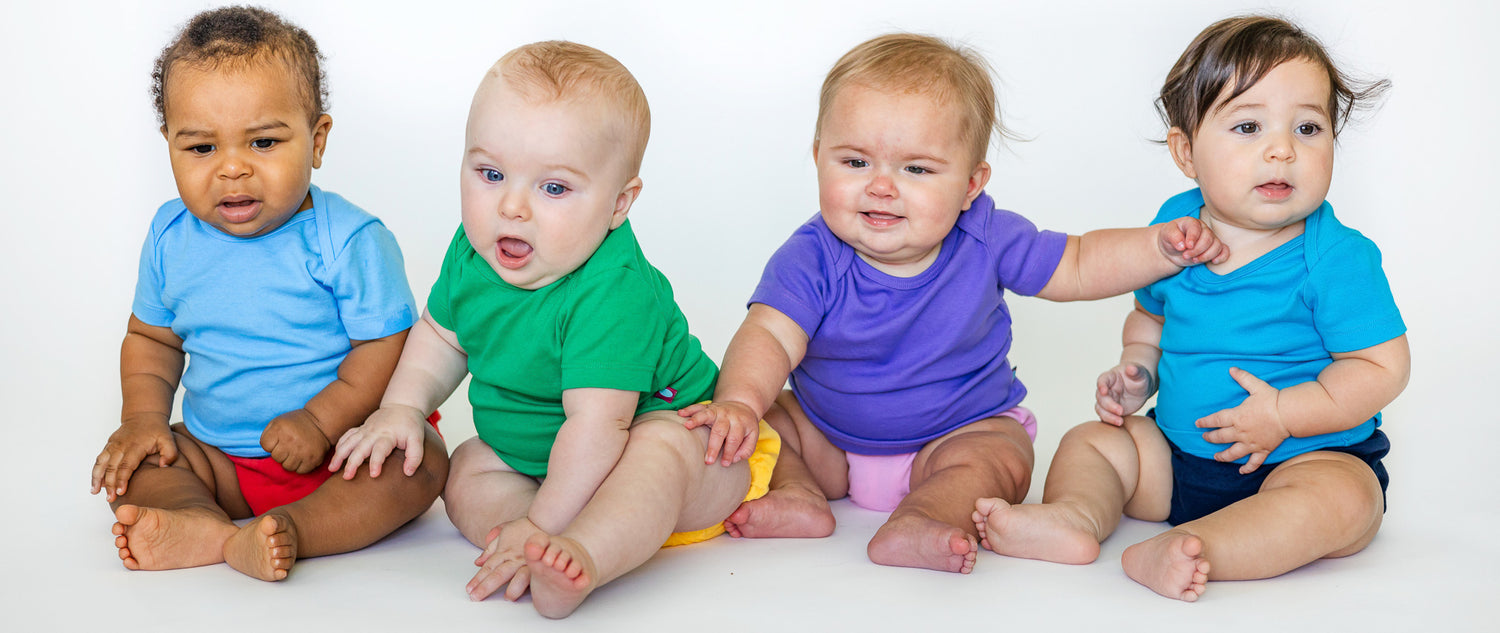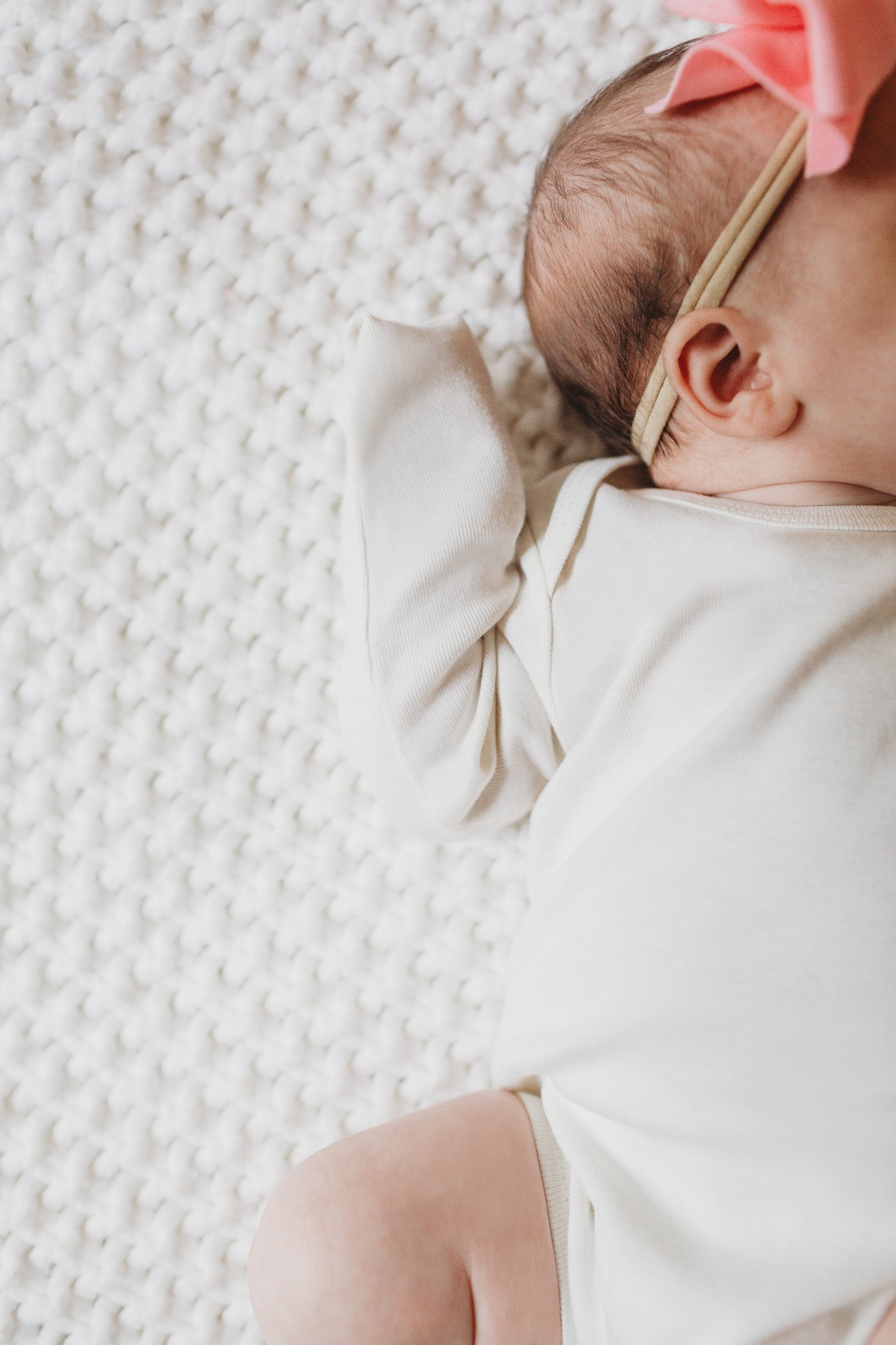February 20, 2024 | 0 min read

Questions often take over like –
When it comes to clothing, there is so much marketing and also a lot of greenwashing out there today. It can be very challenging to weed through the noise and determine what clothing makes the most sense for your baby.
Here’s why we choose 100% organic cotton over bamboo for everyday baby clothing:
Turning Bamboo Into Fabric Is A Chemical-Heavy Process
For many parents, finding less toxic options for their babies is a priority. With our skin being our largest organ and the most absorptive, ditching toxic clothing makes sense. Often bamboo is aligned with being a natural fiber, but that’s not necessarily accurate. Unfortunately, the viscose process that is predominantly used to turn bamboo into fabric for baby clothing requires a highly intensive chemical process. The solvent used includes carbon disulfide, which has been known to cause human reproductive harm, can endanger factory workers, and harm the planet. [epa.gov] It is not entirely clear how much or if any of the chemical residue from the manufacturing process remains on the bamboo clothing after it is processed. However, for the manufacturing process, the harmful effects on workers are extreme. According to Paul D. Blanc in his book Fake Silk: The Lethal History of Viscose Rayon, “throughout most of the 20th century, viscose rayon manufacturing was inextricably linked to widespread, severe and often lethal illness among those employed in making it.” [bthechange.com]
GOTS Certified Organic Cotton Verifies Better Safety For Clothes
Global Organic Textile Standard (GOTS) is the worldwide leading textile processing standard for organic fibers. The program only allows fibers to enter the value chain that have gone through mandatory checks such as GMO and pesticide residue testing. City Threads’ 100% organic cotton baby clothing is made with GOTS certified organic cotton yarn that is knit and dyed in Los Angeles using low-impact dyes.
You Don’t Have To Sacrifice On The Softness
Often, bamboo is touted as being super soft and extra gentle for baby skin. To note, that softness comes from the chemical heavy processing of bamboo – in its more original state, the fabric is more like rough linen. What is exciting is that you can still achieve that super soft fabric feel through the use of 100% organic cotton in baby clothing. With the right knit, organic cotton can offer all the best cozy and comfortable attributes for your baby.
When Can Bamboo Be Considered A Sustainable Option? Bamboo is generally considered a sustainable option because of the way that it grows so easily without a great deal of assistance from farmers. Bamboo can be a more sustainable alternative for plastics, building materials, or furniture, as long as it doesn’t need to be processed in order to be used. According to an article in ScienceDirect, “Bamboo is a really exceptional green building material. It is a sustainable material that requires very less energy to nurture, restrains soil erosion, supplies biofuel, extends wildlife refuge, and manufactures a wholesome food source for both humans and wildlife.”
Labels Can Be Confusing – Rayon vs Bamboo vs Bamboo Lyocell Bamboo fabric is often claimed to be an eco-friendly option. However, the majority of bamboo used in clothing today is actually considered rayon, due to the chemical process needed to convert the bamboo fiber into a soft fabric. Basically, rayon is a fabric made from regenerated cellulose that goes through a chemical process to be used in clothing. The Federal Trade Commission (FTC) requires companies to now list “rayon made from bamboo” instead of just listing “bamboo”. As the FTC states, “The truth is, most “bamboo” textile products, if not all, really are rayon, which typically is made using environmentally toxic chemicals in a process that emits hazardous pollutants into the air. While different plants, including bamboo, can be used as a source material to create rayon, there’s no trace of the original plant in the finished rayon product.” Bamboo lyocell is one bamboo product that is likely to be a better option, according to Good On You, but it is much more rare to come across.
Considering that the viscose production process behind bamboo can negatively impact garment workers, the environment, and in turn, potentially the skin and health of your baby, we highly recommend reaching for 100% organic cotton options first.

Written by: City Threads Cofounders Shayna Samuels & Joe Willis, and Kestrel Jenkins, responsibility consultant & host of the Conscious Chatter podcast.